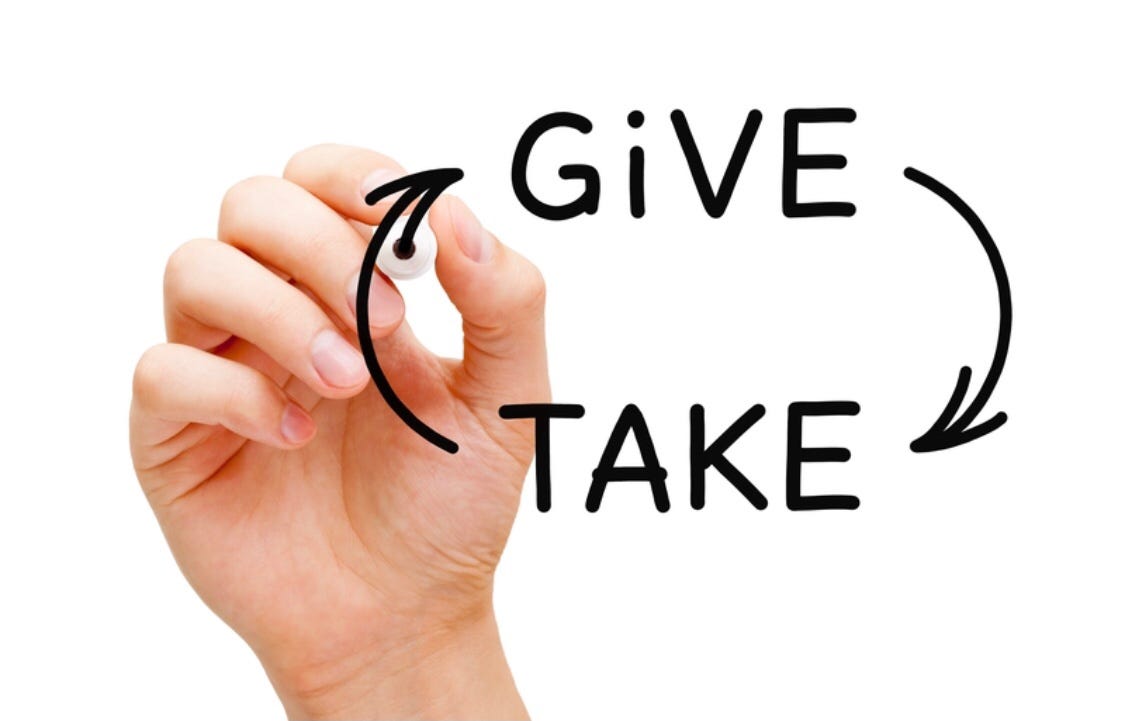Are You a Giver or a Taker? This Quiz Will Tell You
Are You a Giver or a Taker? Have you ever wondered how you truly show up in your relationships; at work, at home, or even in casual conversations? Are you the one who always lends a hand, or are you more focused on getting ahead? While we’d all like to believe we’re generous by nature, the reality might surprise us. According to organizational psychologist Adam Grant, people fall into one of three social interaction styles: Givers, Matchers, and Takers. Some people instinctively give without expecting anything in return, others believe in fair exchanges, and a few are more focused on what they can gain from others. This short and insightful quiz will help you discover where you fall on this spectrum. Are you a selfless contributor, a fairness-focused matcher, or someone who unknowingly leans toward taking more than giving?
The Quiz: Are You a Giver or a Taker?
For each question, choose the option that best describes your typical behavior.
Questions:
1. When working in a team, you usually:
A) Offer help even if it’s not your responsibility (3 points)
B) Focus on doing your part well (2 points)
C) Make sure others pull their weight before you do extra (1 point)
2. A friend needs help moving, but you’re really tired. You:
A) Go anyway and help out (3 points)
B) Apologize and promise to help next time (2 points)
C) Say no—you need your rest more (1 point)
3. In conversations, you mostly:
A) Listen and ask questions about the other person (3 points)
B) Share equally—some talking, some listening (2 points)
C) Talk mostly about your experiences (1 point)
4. You see someone struggling with a task you know how to do. You:
A) Step in and guide them without being asked (3 points)
B) Wait to see if they ask for help (2 points)
C) Assume they’ll figure it out on their own (1 point)
5. When networking, your mindset is:
A) “How can I be helpful to others?” (3 points)
B) “Let’s create a win-win connection” (2 points)
C) “What can this person do for me?” (1 point)
6. How do you feel after doing a big favor?
A) Happy and fulfilled (3 points)
B) A little drained but okay with it (2 points)
C) Irritated unless it was returned or recognized (1 point)
7. If someone takes credit for your work, you:
A) Let it go if it helps the team (3 points)
B) Bring it up politely later (2 points)
C) Confront them immediately—you earned it (1 point)
8. Your ideal work environment is one where:
A) Everyone supports each other selflessly (3 points)
B) People collaborate fairly (2 points)
C) You get ahead by focusing on your own goals (1 point)
Results
Once you’ve added up your total (maximum 32, minimum 8), refer to the table below to interpret your results:
| Score Range | Type | Description |
|---|---|---|
| 28–32 | Giver | You consistently prioritize others’ needs, even when it’s inconvenient. |
| 21–27 | Matcher | You believe in fairness and balance. You give, but expect returns. |
| 13–20 | Selective Taker | You give occasionally, but usually only when there’s a strategic benefit. |
| 8–12 | Taker | You focus more on what you can gain than what you can give. |
How to Grow from Here
🌱 If You’re a Giver
Learn to say “no” without guilt—giving should be a choice, not a compulsion.
Prioritize self-care and recognize when helping others is draining your own well-being.
⚖️ If You’re a Matcher
Occasionally give without keeping score—it builds unexpected trust and goodwill.
Focus on long-term relationships, not just transactional ones.
🎯 If You’re a Selective Taker
Try offering help when there’s no immediate benefit. You’ll be surprised by what you gain in return.
Build empathy by putting yourself in others’ shoes more often.
🧍♂️ If You’re a Taker
Start small: help someone with no expectation of return and observe how it feels.
Reframe giving as a strength—not a sacrifice. Generosity can be empowering, not draining.
Final Takeaway | Are You a Giver or a Taker?
No matter where you landed on the quiz—Giver, Matcher, Selective Taker, or Taker—this is not a verdict, but a mirror. It reflects your current patterns, not your potential. We all shift roles in different phases and relationships. What matters most is the awareness you’ve gained today. That self-awareness is the first step toward meaningful change. So don’t be hard on yourself. Growth is not about being perfect. It’s about being honest, intentional, and kind, both to yourself and others. Whether you’re learning to set boundaries or opening up to giving more freely, you’re on the right path. Keep going; compassionately and consciously.
Further insights, read Give and Take by Adam Grant https://amzn.to/4mveGpj
Read also : 10 Quotes That Will Make You Rethink Your Stuff https://thebrightdelights.com/10-quotes-that-will-make-you-rethink-your-stuff/
